中考英语语法课件:过去将来时态(简化全面)
文档属性
| 名称 | 中考英语语法课件:过去将来时态(简化全面) | 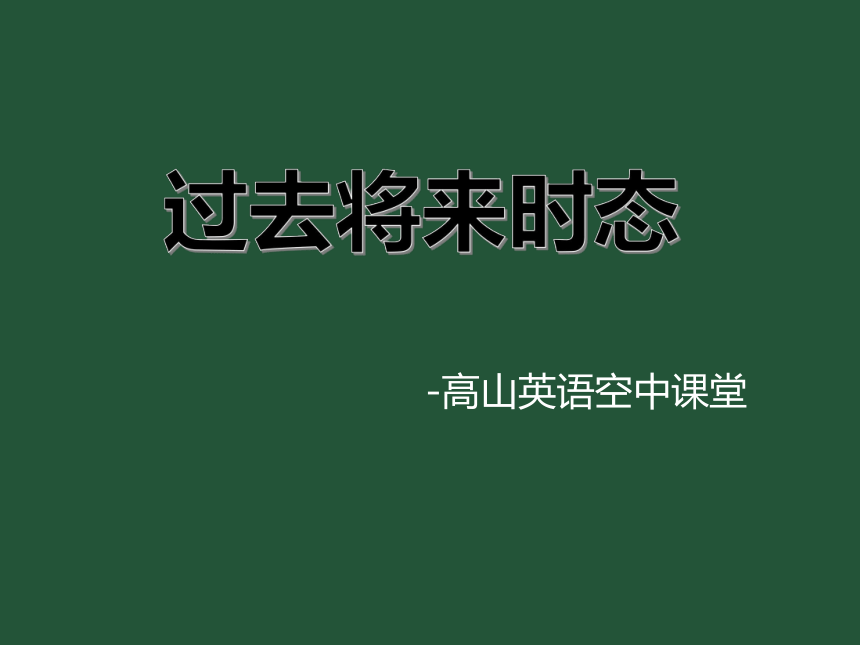 | |
| 格式 | pptx | ||
| 文件大小 | 87.4KB | ||
| 资源类型 | 试卷 | ||
| 版本资源 | 通用版 | ||
| 科目 | 英语 | ||
| 更新时间 | 2022-03-04 09:15:59 | ||
图片预览

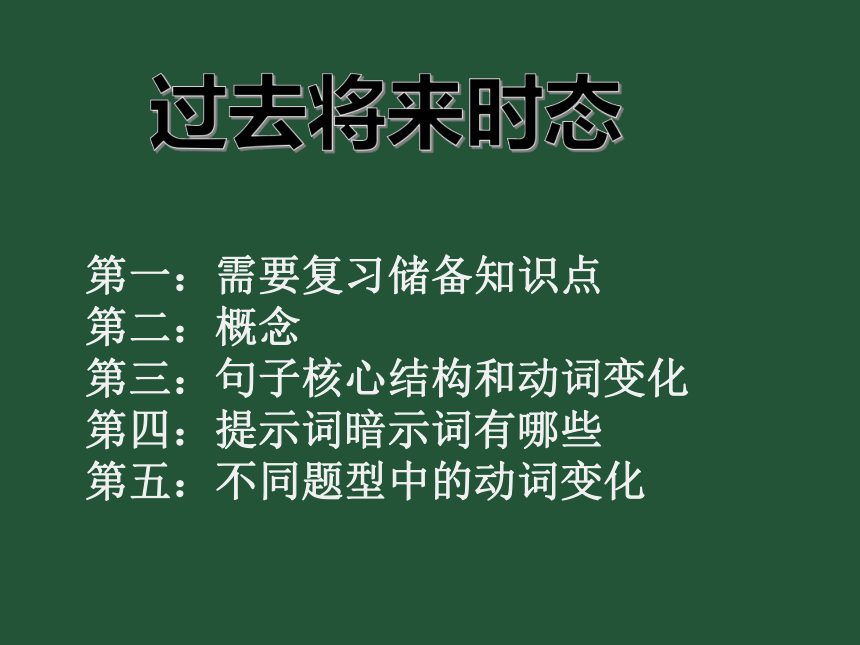
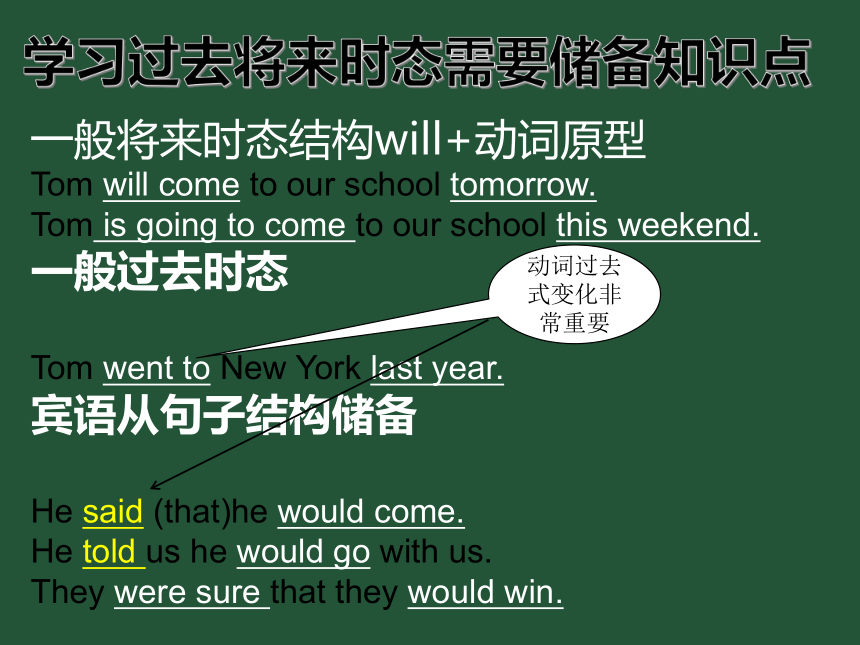
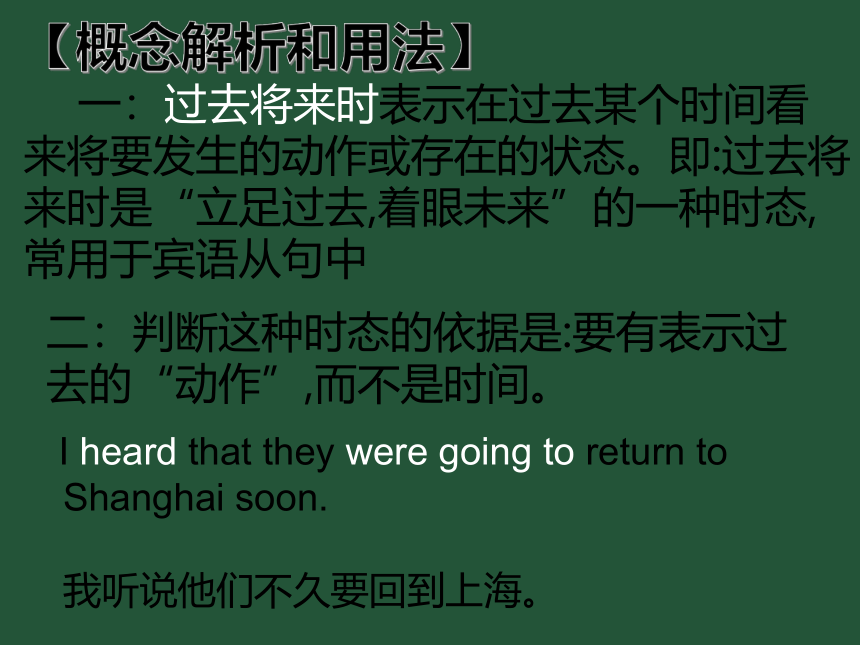
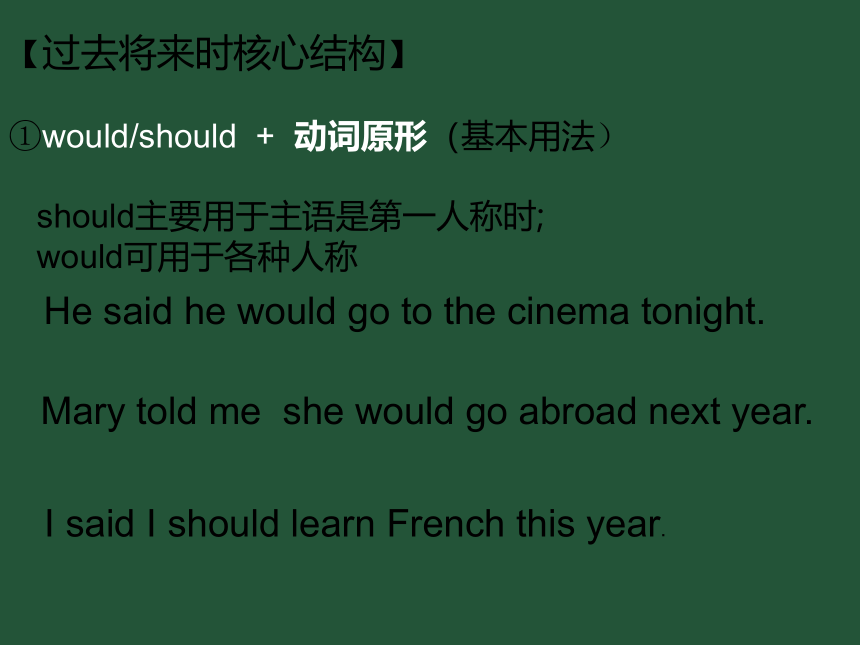
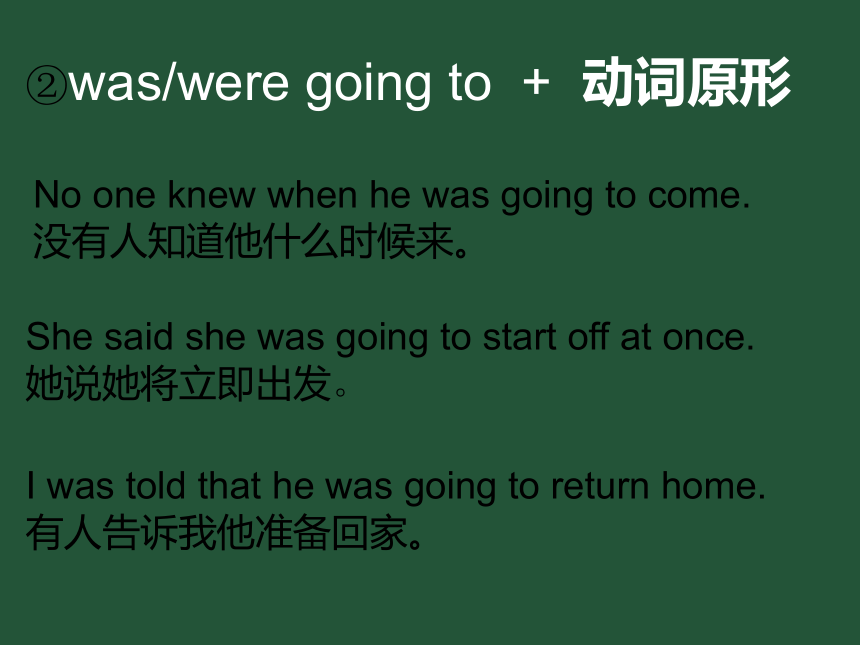
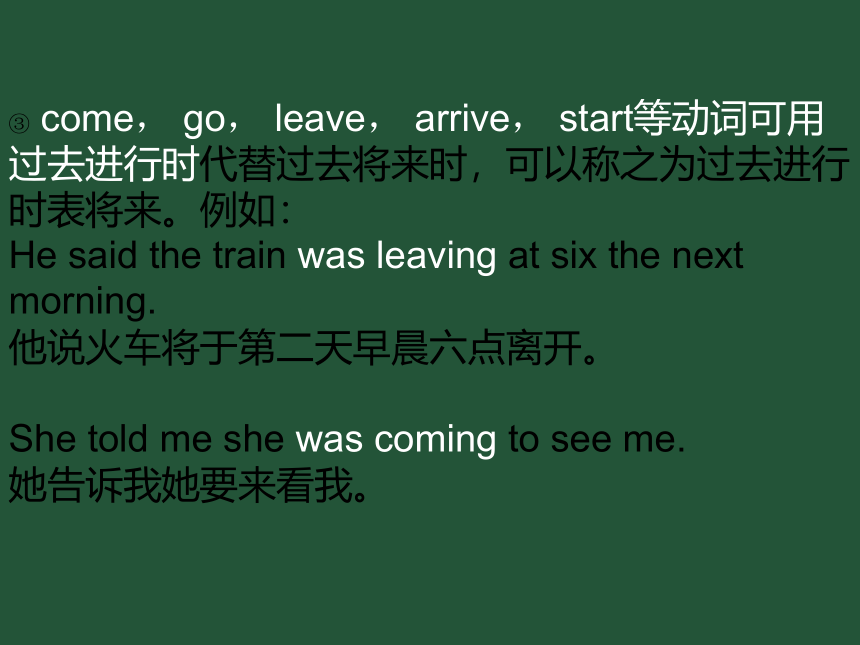
文档简介
(共17张PPT)
-高山英语空中课堂
过去将来时态
过去将来时态
第一:需要复习储备知识点
第二:概念
第三:句子核心结构和动词变化
第四:提示词暗示词有哪些
第五:不同题型中的动词变化
学习过去将来时态需要储备知识点
一般将来时态结构will+动词原型
Tom will come to our school tomorrow.
Tom is going to come to our school this weekend.
一般过去时态
Tom went to New York last year.
宾语从句子结构储备
He said (that)he would come.
He told us he would go with us.
They were sure that they would win.
动词过去式变化非常重要
【概念解析和用法】
一:过去将来时表示在过去某个时间看来将要发生的动作或存在的状态。即:过去将来时是“立足过去,着眼未来”的一种时态, 常用于宾语从句中
二:判断这种时态的依据是:要有表示过去的“动作”,而不是时间。
I heard that they were going to return to
Shanghai soon.
我听说他们不久要回到上海。
【过去将来时核心结构】
①would/should + 动词原形(基本用法)
should主要用于主语是第一人称时;
would可用于各种人称
He said he would go to the cinema tonight.
Mary told me she would go abroad next year.
I said I should learn French this year.
②was/were going to + 动词原形
No one knew when he was going to come.
没有人知道他什么时候来。
She said she was going to start off at once.
她说她将立即出发。
I was told that he was going to return home.
有人告诉我他准备回家。
③ come, go, leave, arrive, start等动词可用过去进行时代替过去将来时,可以称之为过去进行时表将来。例如:
He said the train was leaving at six the next morning.
他说火车将于第二天早晨六点离开。
She told me she was coming to see me.
她告诉我她要来看我。
④ 时间状语从句和条件状语从句中须用一般过去时代替过去将来时。例如:
When she came I would let you know.
她来了我会告诉你。
The teacher said that it would be very difficult to make progress if I didn’t work hard.
老师说,如果我不努力学习的话,就很难取得进步。
提示词/标志词/暗示词相对灵活
整体原则 有一般将来时态的部分提示词
宾语从句和状语从句中则是动词过去式衬托
eg:He said (that) he would visit the Great Wall the next day.
She told me (that) she was moving to France in two days.
He told me that we were to leave at 2:30pm.
Our teacher told us that school began on September 1.
I didn't know when they were coming again.
He said (that)he would come.
He told us he would go with us.
They were sure that they would win.
宾语从句中有过去式衬托过去将来时态动词
过去将来时实战演练和分析
1. 我们不知道他是否要在会上发言。
误:We didn’t know whether he is going to speak at the meeting.
正:We didn’t know whether he was going to speak at the meeting.
析:该句主句为过去时,且宾语从句表示从过去某个时间看来将要发生的动作,所以从句要用过去将来时态。
2. 老师问汤姆长大后准备干什么。
误:The teacher asked Tom what he was going to be when he would grow up.
正:The teacher asked Tom what he was going to be when he grew up.
析:在时间状语从句中,常用一般过去时表示在过去看来将要发生的动作。
3. 他们说如果下星期天不下雨他们就去农场。
误:They said that they were going to the farm if it would not rain the next Sunday.
正:They said that they were going to the farm if it didn’t rain the next Sunday.
析:在条件状语从句中,也常用一般过去时表示在过去看来将要发生的动作。
4. 王林打电话告诉她妈妈,她要买一些书。
误:Wang Lin rang up to tell her mother that she should buy some books.
正:Wang Lin rang up to tell her mother that she would buy some books.
析:过去将来时可以由“助动词should/would+动词原形”构成,但should一般只用于第一人称。而would可用于各种人称。
should 用于第二三人称表示说话人给对方的命令,要求等 ,上句没有此含义。
I. 选择填空
( )1. —What did your son say in the letter
—He told me that he ______ the Disney World the next day.
A. will visit B. has visited
C. is going to visit D. would visit
( )2. I hoped Tina ______ to my birthday party on time the next Wednesday.
A. to come B. is coming
C. will come D. was coming
( )3. Father said that he ______ me to Beijing the next year.
A. took B. would take
C. takes D. will take
D
D
B
( )4. We were not sure whether they ______ more vegetables.
A. are going to grow B. were going to grow
C. will grow D. have grown
( )5. She ______ to work when the telephone rang.
A. is going B. will go
C. was going D. is to go
B
C
II. 用所给动词的适当形式填空
1. Miss Zhang said she __________(visit) the Great Wall the next summer.
2. She told him that she ___________(not stay) here for long.
3. I wasn’t sure whether Lucy__________(come) the next year.
4. The scientists said the world’s population ____________ (grow) slowly in future.
would visit
wouldn’t stay
would come
would grow
Thanks for watching
-高山英语空中课堂
过去将来时态
过去将来时态
第一:需要复习储备知识点
第二:概念
第三:句子核心结构和动词变化
第四:提示词暗示词有哪些
第五:不同题型中的动词变化
学习过去将来时态需要储备知识点
一般将来时态结构will+动词原型
Tom will come to our school tomorrow.
Tom is going to come to our school this weekend.
一般过去时态
Tom went to New York last year.
宾语从句子结构储备
He said (that)he would come.
He told us he would go with us.
They were sure that they would win.
动词过去式变化非常重要
【概念解析和用法】
一:过去将来时表示在过去某个时间看来将要发生的动作或存在的状态。即:过去将来时是“立足过去,着眼未来”的一种时态, 常用于宾语从句中
二:判断这种时态的依据是:要有表示过去的“动作”,而不是时间。
I heard that they were going to return to
Shanghai soon.
我听说他们不久要回到上海。
【过去将来时核心结构】
①would/should + 动词原形(基本用法)
should主要用于主语是第一人称时;
would可用于各种人称
He said he would go to the cinema tonight.
Mary told me she would go abroad next year.
I said I should learn French this year.
②was/were going to + 动词原形
No one knew when he was going to come.
没有人知道他什么时候来。
She said she was going to start off at once.
她说她将立即出发。
I was told that he was going to return home.
有人告诉我他准备回家。
③ come, go, leave, arrive, start等动词可用过去进行时代替过去将来时,可以称之为过去进行时表将来。例如:
He said the train was leaving at six the next morning.
他说火车将于第二天早晨六点离开。
She told me she was coming to see me.
她告诉我她要来看我。
④ 时间状语从句和条件状语从句中须用一般过去时代替过去将来时。例如:
When she came I would let you know.
她来了我会告诉你。
The teacher said that it would be very difficult to make progress if I didn’t work hard.
老师说,如果我不努力学习的话,就很难取得进步。
提示词/标志词/暗示词相对灵活
整体原则 有一般将来时态的部分提示词
宾语从句和状语从句中则是动词过去式衬托
eg:He said (that) he would visit the Great Wall the next day.
She told me (that) she was moving to France in two days.
He told me that we were to leave at 2:30pm.
Our teacher told us that school began on September 1.
I didn't know when they were coming again.
He said (that)he would come.
He told us he would go with us.
They were sure that they would win.
宾语从句中有过去式衬托过去将来时态动词
过去将来时实战演练和分析
1. 我们不知道他是否要在会上发言。
误:We didn’t know whether he is going to speak at the meeting.
正:We didn’t know whether he was going to speak at the meeting.
析:该句主句为过去时,且宾语从句表示从过去某个时间看来将要发生的动作,所以从句要用过去将来时态。
2. 老师问汤姆长大后准备干什么。
误:The teacher asked Tom what he was going to be when he would grow up.
正:The teacher asked Tom what he was going to be when he grew up.
析:在时间状语从句中,常用一般过去时表示在过去看来将要发生的动作。
3. 他们说如果下星期天不下雨他们就去农场。
误:They said that they were going to the farm if it would not rain the next Sunday.
正:They said that they were going to the farm if it didn’t rain the next Sunday.
析:在条件状语从句中,也常用一般过去时表示在过去看来将要发生的动作。
4. 王林打电话告诉她妈妈,她要买一些书。
误:Wang Lin rang up to tell her mother that she should buy some books.
正:Wang Lin rang up to tell her mother that she would buy some books.
析:过去将来时可以由“助动词should/would+动词原形”构成,但should一般只用于第一人称。而would可用于各种人称。
should 用于第二三人称表示说话人给对方的命令,要求等 ,上句没有此含义。
I. 选择填空
( )1. —What did your son say in the letter
—He told me that he ______ the Disney World the next day.
A. will visit B. has visited
C. is going to visit D. would visit
( )2. I hoped Tina ______ to my birthday party on time the next Wednesday.
A. to come B. is coming
C. will come D. was coming
( )3. Father said that he ______ me to Beijing the next year.
A. took B. would take
C. takes D. will take
D
D
B
( )4. We were not sure whether they ______ more vegetables.
A. are going to grow B. were going to grow
C. will grow D. have grown
( )5. She ______ to work when the telephone rang.
A. is going B. will go
C. was going D. is to go
B
C
II. 用所给动词的适当形式填空
1. Miss Zhang said she __________(visit) the Great Wall the next summer.
2. She told him that she ___________(not stay) here for long.
3. I wasn’t sure whether Lucy__________(come) the next year.
4. The scientists said the world’s population ____________ (grow) slowly in future.
would visit
wouldn’t stay
would come
would grow
Thanks for watching
同课章节目录
- 词法
- 名词
- 动词和动词短语
- 动词语态
- 动词时态
- 助动词和情态动词
- 非谓语动词
- 冠词
- 代词
- 数词和量词
- 形容词副词及其比较等级
- 介词和介词短语
- 连词和感叹词
- 构词法
- 相似、相近词比较
- 句法
- 陈述句
- 一般疑问句和否定疑问句
- 特殊疑问句及选择疑问句
- 反意疑问句
- 存在句(There be句型)
- 宾语从句
- 定语从句
- 状语从句
- 主谓一致问题
- 简单句
- 并列句
- 复合句
- 主谓一致
- 主、表语从句
- 名词性从句
- 直接引语和间接引语
- 虚拟语气
- 感叹句
- 强调句
- 倒装句
- 祈使句
- 句子的成分
- 句子的分类
- 题型专区
- 单项选择部分
- 易错题
- 完形填空
- 阅读理解
- 词汇练习
- 听说训练
- 句型转换
- 补全对话
- 短文改错
- 翻译
- 书面表达
- 任务型阅读
- 语法填空
- 其他资料
